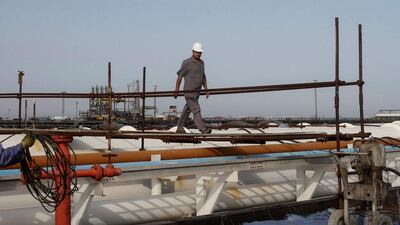Hopes are fading for a deal to limit oil supply levels at a much-anticipated meeting of oil-producing countries this week in Algeria, in spite of signs that Saudi Arabia and Iran may be edging towards an agreement on production levels.
Opec members, together with the non-Opec member Russia, will this week hold informal talks on oil production levels at the International Energy Forum in Algeria, with many producers desperate for an agreement to cut overall production to raise prices.
However a source familiar with Saudi oil thinking said that the kingdom regarded the talks as “consultations”, and not a decision-making meeting.
The comments came after it emerged that Saudi Arabia had offered to reduce its output if Iran keeps its own output at current levels of about 3.6 million barrels per day, as part of discussions with Tehran in Vienna earlier this month. Such signals have proved of little comfort to the market, with most analysts believing the talks in Algeria will produce no new agreement.
“We are convinced that [this] week’s meeting will end without any result, and warn that prices could well correct in view of the high net long positioning of financial investors,” Carsten Fritsch, an analyst with Commerzbank, said in a research note.
Pessimism was compounded by news that the United States was on track to add the highest number of rigs in a quarter since prices began falling two years ago. Brent crude futures fell 3.69 per cent to $45.89 per barrel on Friday, while West Texas Intermediate futures fell 3.97 per cent to $44.48.
Saudi Arabia’s offer to cut production, which has so far not been accepted or rejected by Iran, is the kingdom’s first of its kind since it led Opec to increase production in a move to defend the group’s market share against higher-cost suppliers in the US.
The new Saudi offer has led some to believe that a comprehensive deal on production levels may be agreed at Opec’s next scheduled formal meeting in Vienna in November.
The Opec secretary general Mohammed Barkindo said last week that Iran had assured him that the country was committed to building a consensus on stabilising the oil market between Opec and non-member countries.
Iraq’s Opec governor Falah Alamri, meanwhile, said that oil market circumstances are now more favourable for Opec and other producers to reach a deal to support the market than was the case ahead of similar summit in Doha in April.
That summit imploded after Iran decided at the last minute not to attend, prompting Saudi Arabia to insist that no agreement on production levels was possible without Iranian buy- in.
“This time I think a little bit different [than in Doha] because circumstances are a little bit better, helping [producers] to reach a deal,” Mr Alamri said, when asked about the prospect of an agreement in Algeria.
Brent crude prices have risen by about 25 per cent since the start of the year, but still remain 60 per cent below their peak in June 2014.
The Algerian energy minister Noureddine Bouterfa said Opec – and oil-producing countries outside the group – must find a way to cut crude supplies by 1 million barrels per day to rebalance markets and stabilise prices.
“The question is at what level we would freeze or reduce output – we need to find the good compromise in order not to destabilise the market,” Mr Bouterfa said. “It’s necessary at least to reduce by 1 million barrels a day to rebalance the market. Will we get there? We are working for that.”
jeverington@thenational.ae
* with agencies
Follow The National's Business section on Twitter

